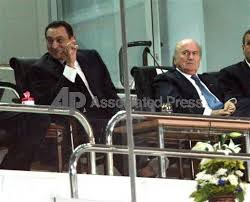
rather than showing a photo of the IHF president, it seems more logical to have a picture of his two role models, ex-president Mubarak with FIFA’s Blatter
John has already drawn sufficient attention to the presentation I gave under the above rubric at the ‘Play the Game’ conference a couple of weeks ago. And I offered a preview of the IHF Congress in three articles just before it started. So in a way there is not much to add now regarding the IHF Congress, as my heading really captures the essence.
There were absolutely no surprises at the IHF Congress. As I had noted, the President had used different methods to secure the necessary votes well ahead of time. And this reality was clear to all the Congress participants, including those many who would have liked to see a regime change. But the IHF president is not a person against whom you launch a battle unless you know that you have a majority of the votes, as he is likely to seek damaging revenge against anyone going up against him. So there were simply no candidates in opposition to the president and his three colleagues on the Executive Committee.
This limited the ‘excitement’ to the election for the added fifth position on the Executive. But here the reports from the Congress make it clear that the president had simply let it be known who his preferred candidate was or, better put, the only one for whom he would direct the huge block of votes which he controlled. The person elected, Frantisek Taborsky of the Czech Republic, a soft-spoken and gentle academic of ‘the old school’, was then not a surprising choice. Frantisek is a nice person who will not ‘ruffle any feathers’, so the president clearly expects him to be loyal and unlikely to create problems.
All the reports suggest that the Congress swallowed the president’s propaganda speeches, and that nobody seriously questioned why the IHF sets aside such an absurdly small amount of its budget for the development of handball in the small or new handball nations around the world. Apropos new members, apparently, the president was in a rage when he found that he did not reach the target of 200 member nations, as the final number came out at 199…. Presumably, there will now be a ‘witch hunt’ to determine whose fault this is.
This just confirms that the focus is on the prestige of the numbers, and indirectly also the number of votes that the president can obtain. It matters less that many of these 199 countries do not really play handball and do not get the support they need and deserve from the IHF. Similarly, it did not seem to disturb the Congress participants that the amounts of revenue from marketing and sponsors are really pitiful for a sport with the traditions and popularity of handball. And there are indications that the main sponsor, Adidas, intends to cut back on it support.
It was interesting to be among a large group of sports officials and journalists from especially Denmark and Germany, when the outcome of the IHF Congress was becoming known. These are, of course, the nations which compete for the honor of having ‘invented’ handball, and our sport has more exposure in these countries than virtually anywhere else. Moreover, at the end of the Congress, the IHF Council decided to award the hosting of the men’s 2019 World Championship to precisely these two countries. While there was some enthusiasm about this decision for 2019, it was also quite obvious that most journalists who follow handball know about the basic problems of the IHF.
But they admit that handball and the IHF never get the same exposure as the IOC and FIFA when governance issues and corruption are given some media attention, beyond the normal reporting of match results, player transfers etc. And to some extent, the defeatist approach of the European Handball Federation and the respective national federations plays a role in that. When the EHF prefers to focus on its own competitions and affairs instead of taking on the problems at the IHF level, and when the Danish and German federations just ‘turn the other cheek’ and beg the IHF to award a World Championship to them, it becomes more difficult for media to take a lot of interest in all the things that need to change in the global world of handball. As some journalists commented, “regrettably, we have become far too used to ethics problems and corruption in international sports, so we do not react as strongly as we should.”
